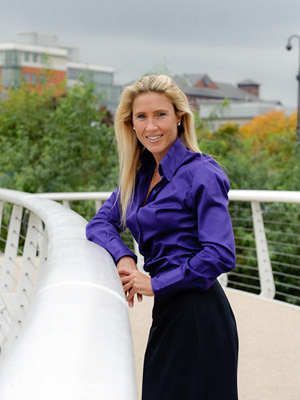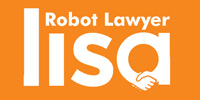Chrissie Lightfoot is co-founder, director and CEO of Robot Lawyer LISA, where she heads up strategy, research and development, as well as business development for artificial intelligence application legal contract solutions for businesses and consumers. Chrissie is a legal futurist, author, speaker and adviser, as well as an investor in artificial intelligence in the legaltech space. In 2015 Chrissie was named as one of the world’s top female futurists, she won the AI 2017 Legal Award for best legal professional coaching company and was appointed as an advisor to the board of The Telegraph’s Digital Enterprise Network.

“…My advice to women who are interested in careers in legaltech is to reach for the stars. The worst that can happen is that you will fall on the moon … and mankind has already been there. So, go where no man or woman has ever been before and blaze a trail!..”
Becoming a lawyer
For the majority of my working life I have been a female entrepreneur, aka self-employed running my own companies in a variety of roles, fields and industries. I’ve always been driven to innovate and push the boundaries to make improvements related to new products and / or services with the focus on the customer / client at the centre of everything. No doubt this passion has been fuelled by my interest in the future as I constantly question “what’s next?”, “what’s possible?”, “how are we going to get there?”
I’ve always had a keen interest and eye for how we (mankind) future-proof our livelihoods, careers, lifestyles, businesses and species, so much so that I have created a portfolio career lifestyle together with a varied skill-set for myself since being a teenager.
About ten years ago I reached a stage in my life where I felt I needed to add another skill to my portfolio handbag of skills, and that was ‘legal’. As a woman in business it made sense to get a grip and truly understand the law involved in ‘doing business’ and I could see that there was a huge disconnect between what buyers of legal services wanted (having experienced this first hand) and what law / legal suppliers at that time were offering.
Spotting a gap in the legaltech space
Having run an Internet company and successfully used technology innovatively online in a leisure company to smash sales targets during 2000 to 2006, I knew that the legal industry was ripe to be disrupted too … in a positive way, and so I trained to be a solicitor. During this period, I experienced a great deal of resistance from colleagues (mainly solicitor partners) to embrace and / or use technology, whether it be for internal business process or external facing client focus.
Frustrated by this lack of foresight by the partners back in 2009 of what was lying ahead in relation to the threat and opportunity of the looming digital, artificial intelligence (AI) and the robotic age, on qualifying as a solicitor I promptly left the law firm and founded Entrepreneur Lawyer Limited in a move to bridge the gap between the legal world and business world.
The rest, as they say, is history. For the past eight years I have had the real honour of working with entrepreneurial lawyers and their businesses of law, technologists and their innovative technology companies, entrepreneurs and their pioneering businesses.
Spotting a gap in the legaltech space, and more importantly, the legal ecosystem – noting a real problem for businesses and consumers that could be solved through the imaginative and re-invented use of advanced technology such as expert systems together with AI – in mid-2016 I set up and co-founded AI Tech Support Ltd, trading as Robot Lawyer LISA.
My role on a day to day basis
My role involves juggling and hat swapping, together with a big dollop of passion, energy and enthusiasm thrown into the pot.

One day I may be liaising with the knowledge architects / design engineers and the ‘brain-dump’ lawyers, checking off the development / improvements / maintenance to the existing suite of LISA’s contract AI apps, pitching in person to potential investors and / or prospective clients, and meeting with partners / affiliates.
The next day I may be liaising with the media and public relations team or website developers, our referrer team, attending to interviews, preparing speeches, ‘opening doors’ to prospective clients, meeting with current clients and liaising with my co-founder lawyer to draw up legal documents associated with the same.
More about legaltech
The term legaltech, as I understand and view it, is rather broad encompassing technology that is used within the entire legal buyer and legal supplier ecosystem. Law firms, in-house legal departments in corporations, ‘non-lawyer’ employees within companies, clients / customers of businesses or consumers may use legaltech directly for themselves.
Legaltech assists with business process and ‘fee-earning’ process, as well as client / customer process, delivery and even self-help and self-serve by clients / customers. Nowadays legaltech comprise a whole range of automation: robotic process automation; cognitive computing; AI; chatbots; machine learning; smart contracts and blockchain technology etc.
Robot Lawyer LISA – a hybrid human and machine system
Robot lawyer LISA is the world’s first impartial AI lawyer. It is a hybrid human and machine system that enables two lay parties to create a legally binding contract, together, bilaterally, without any human lawyer input on either side.
The premise behind LISA is to make quality legal insight and guidance / support / advice simpler, faster, more accessible (available 24/7, 365 and globally), transparent and affordable to consumers and business people – average lay people – the majority of the public that cannot afford legal services i.e. the neglected 90%. LISA also saves a great deal of time and money for those who may currently use human lawyers in the traditional way.
Here in the UK, one in ten consumers and businesses have never used a human lawyer / law firm. We aim to open up the latent legal market as well as serve the disgruntled current legal buyer market, globally.
Our flagship AI tool is a non-disclosure agreement (NDA) / confidentiality agreement and we have recently launched a suite of three property related AI tools; commercial lease; residential lease; lodger agreement. These contract AI tools are proving to be a great value add for a whole range of professional service firms, business people, enterprise hubs, business associations, corporate and property related businesses and their people (investors, employees, members, customers, users, visitors) as the number of self-employed / entrepreneurs and letting / renting / lodging of property (whole or in part) in this digital age and nascent AI / robot age continues to grow.
How LISA works
To understand how LISA was developed and works we’ve knowledge-engineered superior AI-based (legal and commercial) documents (embedded with 30 years of legal and commercial experience of a qualified and practicing solicitor in each case), before we ask a number of queries supported by information, knowledge and experience from the same human lawyers, which users read and consider before responding to the questions. These answers then create a bespoke agreement to get the users to a middle ground as quickly and cost effectively as possible as they navigate the legal and commercial nuances involved.
For example, a landlord and a tenant (two lay people), assuming the landlord initiates a business (or residential) lease, will build the initial lease document using the LISA tool. As they work through it, they are given support, proper notes, legal and commercial knowledge and intelligence. They receive help on how to decide how to answer questions.
It’s impartial because the person that you’re sending it to on the other side also comes into the system and uses LISA and goes through the same process themselves so they get to see exactly what the initiator also had put into the system. As the receiver you can alter anything. For example, you can alter in the initial draft that the initiator wants the lease to last three years by changing it to 18 months. Or anything that two lay people would need to negotiate over where traditionally they would each have to take advice from two independent human lawyers.
Unique system + market need = Winning formula
There’s no other system out there at the moment where two lay people can actually create a binding legal document, together, between themselves, with the legal (and commercial) veil lifted so that the advice is totally transparent to each lay party. For example, if you’re a landlord you can understand what the tenant would be told if a human lawyer was advising the tenant and vice versa. You can make informed legal and commercial decisions yourself due to LISA’s impartial assistance.
A major issue in using human lawyers in the traditional way is the time that it takes to get the opposing parties to an agreement. Sometimes this is because disingenuous solicitors tactically take longer because they know they are racking up more fees the longer it takes, especially if it’s arguing basic (or complex) terms that the other side is quite happy to agree to if they understand fully the legal and commercial implications.
We believe that the winning formula for those people and businesses needing affordable (low-cost), insightful, nuanced, quality legal documents requires a combination of deep legal domain expertise together with commercial experience and technology. This is what Robot Lawyer LISA’s contract AI tools encompass and provide.
Don’t get scared, get skilled
AI and robots will continue to replace human jobs whilst augmenting others, increasingly: Fact. If you do nothing, then you ought to be worried. However, as these human roles and skill-sets will invariably shift it is up to each and every one of us to re-invent ourselves and apply the skills that the machines cannot do, yet.
I have no doubt that as AI and robotic technology improves and evolves exponentially over the coming years there will be more replacing than augmenting, even in relation to the ‘human-skills’ that we may think machines cannot or will not master too. Nations, governments, regulators, policy and law-makers and all people throughout the world have a difficult and challenging time ahead to come up with economic solutions to this very real problem which will affect all of us in every country either positively or negatively.
The fact of the matter is, we’re all in this together. But mankind must evolve in order to handle both the promise and peril that AI and robots in our family, leisure and working lives will inevitably bring.
My advice to women who are interested in careers in legaltech is to reach for the stars. The worst that can happen is that you will fall on the moon … and mankind has already been there. So, go where no man or woman has been before and blaze a trail!
Looking to the future
In the future I am most excited about space tourism and space travel. As astronomers and scientists consistently make new discoveries together with entrepreneurs such as Elon Musk and Richard Branson boldly and fiscally supporting such daring ventures and explorations it as an understatement to say that we live in a golden technological age.
We are truly privileged that within our lifetime developments such as mankind being able to colonise another planet within our solar-system (or beyond) may be a reality and no longer a fantasy.
As for legaltech, I’d be happy if it was used primarily to take a huge bite out of the 90% of the latent legal buyer market where the vast majority of people in many nations desperately need / want quality legal services and products but such ‘luxuries’ are currently out of reach.
What I have shared in this interview provides a clue about what is coming up next with LISA and the team. Whatever we do, it will be customer-led together with technology-led and ultimately mankind-led.
https://twitter.com/robotlawyerlisa
https://twitter.com/TheNakedLawyer






